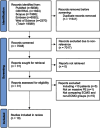Survival after venoarterial extracorporeal membrane oxygenation for acute high-risk Pulmonary Embolism: A meta-analysis of comparative studies
- PMID: 39867790
- PMCID: PMC11755287
- DOI: 10.12669/pjms.41.1.10568
Survival after venoarterial extracorporeal membrane oxygenation for acute high-risk Pulmonary Embolism: A meta-analysis of comparative studies
Abstract
Objective: The survival benefit of venoarterial Extracorporeal Membrane Oxygenation (ECMO) for the management of acute high-risk pulmonary embolism (PE) remains unclear. This meta-analysis combines data from comparative studies to assess the risk of mortality after ECMO vs standard care in the management of acute high-risk PE.
Methods: Databases of PubMed, CENTRAL, Scopus, Web of Science, and Embase were searched from 01st January 2000 to 24th March 2023 for comparative studies with at least 10 patients/group comparing ECMO vs standard treatment. PRISMA guidelines were followed for this review. We extracted mortality data and combined it to obtain the outcome as risk ratios (RR) with 95% confidence intervals (CI) in a random-effects model.
Results: Ten studies were included. Meta-analysis showed that the risk of early mortality was not significantly different between ECMO and non-ECMO groups (RR: 0.97 95% CI: 0.78, 1.19 I2=73%). No change in significance was noted on subgroup analysis based on study location, sample size, cardiac arrest, systemic thrombolysis, and surgical embolectomy.
Conclusion: Limited evidence derived from mostly retrospective studies riddled with selection bias suggests that ECMO may not offer additional survival benefits in high-risk PE.
Keywords: Critical care; Extracorporeal Membrane Oxygenation; Mortality; Thromboembolism.
Copyright: © Pakistan Journal of Medical Sciences.
Figures
References
-
- Prabhu W, Soukas PA. Pulmonary Embolism in 2017: Increasing Options for Increasing Incidence. R I Med J (2013) 2017;100(5):27–32. - PubMed
-
- Meneveau N. Therapy for acute high-risk pulmonary embolism: thrombolytic therapy and embolectomy. Curr Opin Cardiol. 2010;25:560–567. doi: 10.1097/HCO.0B013E32833F02C5. - PubMed
-
- Gupta R, Ammari Z, Dasa O, Ruzieh M, Burlen JJ, Shunnar KM, et al. Long-term mortality after massive, submassive, and low-risk pulmonary embolism. Vasc Med. 2020;25:141–149. doi: 10.1177/1358863X19886374. - PubMed
-
- Tapson VF. Treatment of pulmonary embolism: anticoagulation, thrombolytic therapy, and complications of therapy. Crit Care Clin. 2011;27:825–839. doi: 10.1016/J.CCC.2011.08.002. - PubMed
Publication types
LinkOut - more resources
Full Text Sources


